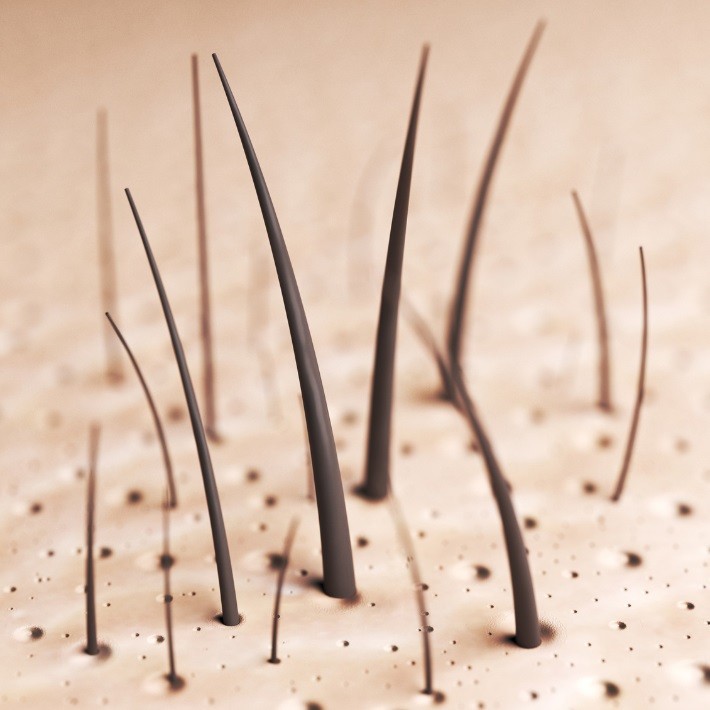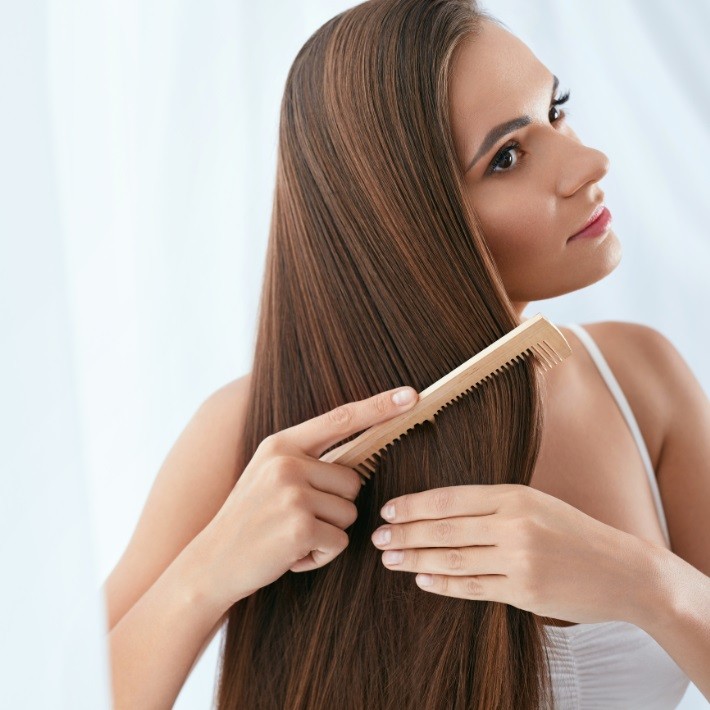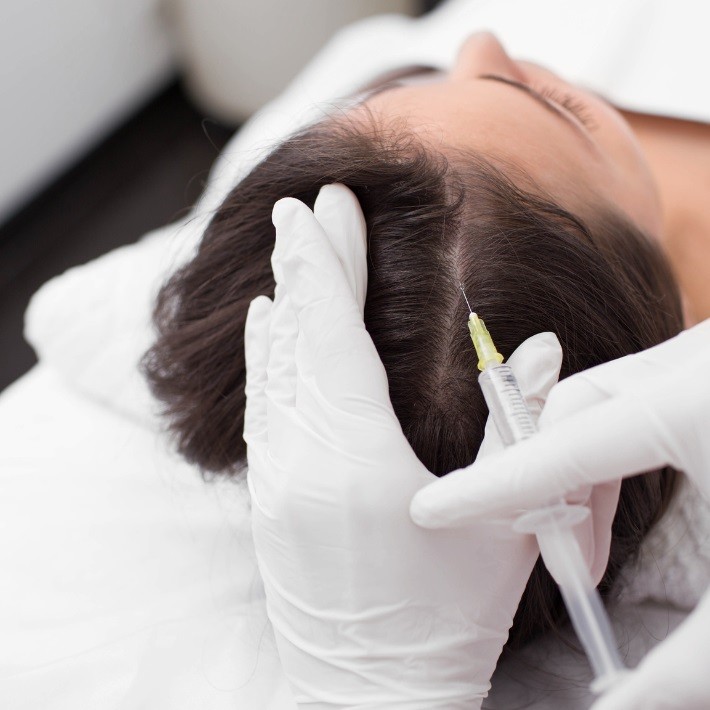Last Updated on March 28, 2025
Hair typically grows approximately half an inch per month, so it would take approximately two years to grow hair 12 inches. Growing hair 12 inches can seem like a daunting task, but patience is key.
On average, hair grows about half an inch a month, which equals about six inches per year. Therefore, it would take roughly two years to grow 12 inches of hair. Certain factors such as age, genetics, and diet can influence hair growth.
While there is no guaranteed way to speed up hair growth, maintaining a healthy lifestyle and hair care routine can promote healthy hair growth. This includes regularly trimming split ends, avoiding harsh chemicals and heat styling, and consuming a diet rich in nutrients such as vitamins A, C, D, and E, Biotin, and Iron.
How Hair Growth Works

Everyone longs to have beautiful, flowing locks, but it can take some time to achieve this. Many people wonder how long it takes to grow hair 12 inches. While there’s no hard and fast answer to this question, there are some key factors that affect hair growth.
We write here some essential factors and understand why hair growth takes time.
Related: Benefits Of Scalp Massage For Hair Growth
The Structure Of Hair Follicles
Hair follicles are tiny pouches located in the skin that are responsible for growing hair. Each hair follicle has a bulb-shaped structure at its base, which is where hair growth begins. The bulb-shaped structure contains blood vessels that provide vital nutrients and oxygen to the hair, enabling it to grow.
The hair’s protein, keratin, is produced in the bulb-shaped structure and transported up the hair shaft, forming new hair.
The Growth Phases Of Hair
There are three growth phases that each hair strand goes through – anagen, catagen, and telogen.
Anagen: this is the active growth phase where hair grows around 0. 5 inches every month. Hair can grow continuously for up to six years during this phase.
Catagen: this is the transitional phase lasting around two weeks. During this phase, the hair follicle shrinks, and hair growth slows down.
Telogen: this is the resting phase that lasts around three months, and the hair falls out at the end of the phase.
After the telogen phase, the growth cycle begins again, and a new hair strand starts to grow. It takes time to go through each growth cycle, which is why hair growth is a gradual process.
Factors That Affect Hair Growth
Hair growth varies from person to person, and there are several factors that can affect it. Some of these factors include:
- Genetics
- Age
- Nutrition
- Hormones
- Health conditions
- Stress levels
While some of these factors, such as genetics and age, can’t be changed, there are things you can do to improve your hair growth. Consuming a balanced diet rich in vitamins and minerals, staying hydrated, and managing stress levels can all have a positive impact on hair growth.
It’s essential to understand that hair growth is a gradual process and varies from person to person. While it may be tempting to try hair growth products that promise quick results, it’s essential to be patient and understand that healthy hair growth takes time and effort.
By taking care of your hair and following a healthy lifestyle, you can achieve beautiful, healthy hair.
Average Hair Growth Rate

Hair growth rate varies from person to person and is primarily dependent on genetics, age, overall health, and environmental factors. On average, human hair grows at a rate of 0. 5 inches (1. 25 cm) per month, or 6 inches (15 cm) per year.
It is important to note that many factors can influence this rate of growth.
Factors That Affect Hair Growth Rate
- Genetics: The rate of hair growth is mostly determined by a person’s genetics. This means that if hair grows slowly in someone’s family, it is likely to be the same for them.
- Age: As people age, the rate of hair growth slows down due to hormonal changes and other factors. This means that older individuals may find it harder to grow their hair 12 inches than younger ones.
- Health: Good nutrition and staying hydrated can help promote healthy hair growth. Conditions like anemia, thyroid disorders or hormonal imbalances can lead to hair thinning and cause slower hair growth.
- Environment: Exposure to extreme weather, pollutants, and harsh chemicals can damage hair and stunt its growth.
How To Measure Hair Growth
Measuring hair growth can be done in several ways, including using a ruler, a measuring tape, or simply assessing its appearance. Here are some tips on how to measure hair growth:
- Pull the hair taut to measure it accurately.
- Measure from the tip of the hair to the scalp.
- Take measurements at regular intervals (weekly or monthly) to track progress.
- Use photographs to compare the length of your hair over time.
While the average rate of hair growth is 0. 5 inches (1. 25 cm) per month, factors such as genetics, age, health, and environment can affect this rate significantly. To measure hair growth, use a ruler, measuring tape, or assess appearance, and track progress over time.
Remember that healthy hair growth starts with good nutrition and hydration.
Timeline For Growing Hair 12 Inches
A Realistic Expectation For Hair Growth
Growing hair 12 inches is a considerable task, and it is essential to be realistic with your expectations. Hair grows approximately half an inch every month, which means it could take around two years to grow 12 inches of hair.
Several factors impact your hair growth, including genetics, diet, and lifestyle, and it is important to understand how these affect hair growth.
Tips For Promoting Hair Growth
There are several effective ways to promote hair growth and achieve your desired goal of growing your hair 12 inches. Consider the following tips:
- Regular trimming: Trimming your hair regularly eliminates split ends and ensures healthy hair growth.
- Stay hydrated: Drinking the recommended amount of water every day helps to nourish your hair follicles, fuelling hair growth.
- Regular scalp massage: Massaging your scalp regularly improves blood circulation around the hair follicles, promoting hair growth.
- Hair care routine: Creating a hair care routine tailored to your hair type is essential as it keeps your hair healthy and promotes growth.
- Protection against heat damage: Excessive heat styling can damage your hair, so it’s essential to use heat protection products when using heat styling tools.
How Diet And Lifestyle Affect Hair Growth
Diet and lifestyle choices play a significant role in hair growth. Here are some things to keep in mind:
- Eating a balanced diet that includes fruits, vegetables, and proteins helps to fuel healthy hair growth.
- Getting enough vitamins, such as biotin, vitamin D, and iron, is essential for healthy hair growth.
- Stress can impact hair growth negatively, leading to hair fall, so it’s essential to adopt stress-relieving techniques such as meditation.
- Smoking and alcohol can harm hair growth, as it decreases the body’s ability to absorb essential nutrients and cause damage to hair follicles.
By understanding the factors that positively and negatively impact hair growth, it’s possible to achieve healthy hair growth and meet your goal of growing hair 12 inches. Consistency with a regular hair care routine and healthy lifestyle choices will ensure that you can achieve this goal in a realistic timeframe.
Best Practices For Fast Hair Growth
How Long Does It Take To Grow Hair 12 Inches?
Growing hair 12 inches long is possible, but it can take a long time depending on various factors such as your hair’s natural growth rate, age, and overall health. There are a few things you can do to speed up the process.
Keep reading to learn the best practices for fast hair growth that you can incorporate into your hair care routine.
Scalp Massage Techniques
Massaging your scalp can stimulate hair growth by increasing blood circulation and encouraging the hair follicles to produce hair. Here are some scalp massage techniques that can help:
- Circular motion: Start from the front of your scalp and use small, circular motions with your fingers. Work your way down to the nape of your neck, then back up to the top of your head.
- Kneading: Use your fingertips to knead your scalp gently. Begin at the forehead and work your way down to the neck, then move back up to the crown of your head.
- Pressure point massage: Using your fingertips, apply strong pressure to certain areas of your scalp. Hold for a few seconds, then release and move on to the next area.
Hair Care Products That Promote Growth
Using hair care products that promote growth can aid in the hair growth process. Here are some ingredients and products that can be beneficial:
- Biotin: A vitamin that encourages hair growth and overall hair health. Take supplements or use hair care products containing biotin.
- Keratin: A protein that makes up hair, skin, and nails. Use keratin-infused hair care products to strengthen and nourish your hair.
- Essential oils: Certain essential oils, such as lavender and rosemary, can stimulate hair growth. Mix a few drops with carrier oil and massage into your scalp.
Natural Supplements And Vitamins For Hair Growth
Vitamins and supplements can also promote hair growth. Here are some options to consider:
- Vitamin D: A vitamin that is important for hair growth. Get vitamin D from sunlight or take supplements.
- Iron: A mineral that aids in the production of hemoglobin, which carries oxygen to the hair follicles. Eat iron-rich foods or take supplements.
- Fish oil: Contains omega-3 fatty acids that promote hair growth and overall hair health. Take fish oil supplements or consume omega-3-rich foods like salmon and chia seeds.
Incorporating these scalp massage techniques, hair care products, and natural supplements into your hair care routine can help promote fast hair growth. Remember to always consult with a healthcare professional before taking any supplements or making significant changes to your hair care routine.
Related: What Is Fairy Hair?
Home Remedies For Hair Growth
Growing your hair can be a long process, but with consistency and dedication to maintaining healthy hair, it’s possible to reach your desired hair length. Many factors affect hair growth rate, including age, genetics, nutrition, and hair care routine.
Diy Hair Masks For Growing Hair
Hair masks are a great way to strengthen and nourish hair, helping to promote growth. Here are some DIY hair masks that you can try at home.
- Avocado and egg hair mask: Mix one mashed avocado with one egg to form a paste. Apply it to your hair and leave it for 30 minutes before washing it off.
- Coconut oil and honey hair mask: Heat up two tablespoons of coconut oil and mix it with one tablespoon of honey. Apply it to the hair and leave it for one hour before washing it off.
- Banana and honey hair mask: Mash one ripe banana and mix it with one tablespoon of honey. Apply the mixture to your hair and leave for 15-20 minutes before washing it off.
Essential Oils For Hair Growth
Essential oils can be beneficial for hair growth as they have antibacterial, antifungal, and anti-inflammatory properties. Here are some essential oils that you can try at home.
- Peppermint oil: Stimulates hair growth by increasing blood flow to the scalp. Mix a few drops with carrier oil and massage into hair for five minutes before washing it off.
- Rosemary oil: Stimulates hair growth and improves hair thickness. Mix a few drops with carrier oil and massage into hair for five minutes before washing it off.
- Lavender oil: Promotes hair growth and has a soothing effect on the scalp. Mix a few drops with carrier oil and massage into hair for five minutes before washing it off.
Food That Promotes Hair Growth
Nutrition plays a significant role in hair growth, and a balanced diet can promote healthy hair growth. Here are some foods that can promote hair growth.
- Eggs: Rich in protein and biotin, a b-vitamin essential for hair growth.
- Spinach: A good source of iron and vitamins A and C, which promote hair growth.
- Salmon: Rich in omega-3 fatty acids, which promote hair growth and maintain scalp health.
- Sweet potatoes: Rich in beta-carotene, which encourages the production of sebum on the scalp, promoting hair growth.
Incorporating these home remedies into your hair care routine can help promote hair growth and maintain healthy hair. Remember to be consistent and patient with your efforts, as hair growth can take time.
Understanding Hair Loss
Hair loss is a prevalent issue that affects both men and women. Hair grows at an average rate of half an inch per month, which means that it would take about two years to grow hair 12 inches. Not all hair grows at the same rate, and some factors can affect the growth rate and cause hair loss.
This post aims to provide insight into hair loss and the different types of hair loss and treatment options available.
Different Types Of Hair Loss
Hair loss is generally categorized into two:
- Scarring (cicatricial) alopecia – this type of hair loss occurs when inflammation damages and scars hair follicles. Hair loss is permanent and develops slowly.
- Non-scarring (non-cicatricial) alopecia – this type of hair loss is temporary, and the hair often regrows after the underlying cause is treated.
Medical Conditions That Affect Hair Growth
Several medical conditions can cause hair loss. Here are some of them:
- Cancer treatment – chemotherapy and radiation therapy destroy the hair follicles, resulting in hair loss.
- Hormonal imbalance – hormonal imbalances, such as those associated with pregnancy, menopause, and thyroid problems, can cause hair loss.
- Autoimmune diseases – autoimmune diseases such as lupus can cause hair loss by attacking the hair follicles.
- Nutrient deficiencies – vitamins and minerals such as iron, zinc, and biotin are crucial for hair growth and deficiency in any of these nutrients can cause hair loss.
- Medications – certain medications such as blood thinners, antidepressants, and beta-blockers can also cause hair loss.
Hair Loss Prevention And Treatment Options
- Hair supplements – supplements containing amino acids, biotin, and vitamins can help improve hair health and promote growth.
- Medications – medications such as minoxidil and finasteride can help slow down hair loss and stimulate hair growth.
- Low-level laser therapy – this treatment option uses light energy to promote hair growth by stimulating hair follicles.
- Hair transplantation – this involves transplanting healthy hair follicles from the scalp’s back to the affected areas.
Hair loss is a common issue that affects a significant number of people. The type of hair loss determines the treatment options available. It’s crucial to seek a medical professional’s advice before taking any medications or supplements for hair loss.
Professional Hair Growth Treatments

Everyone desires luscious, long locks, but not everyone has the patience to wait years for hair to grow 12 inches. Fortunately, there are professional hair growth treatments available that can help speed up the process.
Hair Transplant Surgery
Hair transplant surgery is a popular permanent solution for hair thinning or balding. Here are its essential points:
- A surgeon takes hair follicles from a donor area and grafts them onto the balding or thinning areas.
- The procedure takes several hours or even days, depending on the amount of hair to be transplanted.
- Recovery time can vary from patient to patient but usually takes about two to five days.
Laser Therapy
Laser therapy is a relatively new and non-invasive hair growth treatment that uses light energy to stimulate hair growth. Here are some key points on laser therapy:
- The procedure involves the use of low-level lasers to stimulate hair follicles.
- It requires multiple sessions over a few months to achieve desired results.
- The sessions are typically quick and painless, with no recovery time needed.
Related: What Percentage Of People Have Curly Hair?
Hair Growth Medication
There are various hair growth medications available in the market. Here are its essential points:
- Minoxidil and finasteride are the two most popular medications for hair growth.
- Minoxidil is a topical solution that helps stimulate hair growth.
- Finasteride is a pill that helps reduce the production of DHT, a hormone that causes hair loss in men.
Professional hair growth treatments can help you achieve the luscious locks you’ve been dreaming of. While these treatments can deliver quick results, they can also be expensive and require multiple sessions. Consider consulting with a hair growth specialist to determine which option best suits your needs.
Frequently Asked Questions Of How Long Does It Take To Grow Hair 12 Inches?
Understanding Hair Growth And Time Required
Hair grows at an average of 0. 5 inches per month, thus it can take up to 2 years to achieve 12 inches.
Factors That Determine Hair Growth
The hair growth rate is determined by genetics, age, nutrition, and overall health, so growing 12 inches in one year is unlikely.
Debunking The Hair Cutting Myth
Cutting hair does not make it grow faster, as the rate of growth happens at the scalp level and is not affected by cutting.
Tips On Promoting Hair Growth
Maintaining a healthy diet, reducing stress, and using hair growth products and treatments can help promote faster hair growth.
Understanding Hair Growth Stages
Hair goes through growth, transition, and resting stages, and ultimately stops growing due to genetics and the length of the resting stage.
Conclusion
Growing hair 12 inches may seem like an impossible task to many of us, but it is achievable with the right measures and a fair amount of patience. While genetics and age are two necessary factors affecting the speed and quality of hair growth, maintaining good hair care habits can go a long way in accelerating the process.
A healthy and balanced diet, regular scalp massages, and avoiding harsh styling products and techniques will promote the growth of healthy hair. Furthermore, adequate hydration and ample rest are essential for vibrant hair growth throughout one’s lifetime. As we conclude, the timeline for growing hair 12 inches may vary significantly based on individual factors, but a consistent and healthy routine will undoubtedly yield positive results over time.
Incorporating good hair care habits into our daily routine can lead to healthier and longer hair, and that’s something we all desire.

